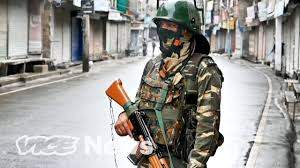China and Pakistan Are Ganging Up on India in a Border Dispute
Thursday, December 10, 2020
Categories: ASCF News Emerging Threats National Preparedness

URI, Kashmir — Bashir Ahmed Dar went out to fetch firewood one day last month so his wife could prepare lunch for their five children, who were out playing. Moments after he left, a mortar hit his house. He rushed back home, and found his wife in the rubble.
“She had three injuries. When she tried to get up, she couldn’t get up… So how could I do anything?” Dar told VICE News. “We buried her after 9:30 p.m., after the shelling stopped.”
The shelling went on for 12 hours that day, Nov. 13, one of the deadliest days this year along the “line of control,” the de facto border between India and Pakistan, with each side accusing the other of targeting civilian areas as they exchanged fire over the long-disputed area. Six civilians and five soldiers were killed on the Indian side, and five civilians and one soldier on the Pakistani side.
The ceasefire violations have grown exponentially in the last few years, peaking in 2020, as the rival nations move to secure their claims over disputed territories—with China now backing Pakistan.
In 2019, Indian Prime Minister Narendra Modi changed the constitution to tighten his grip on the Kashmir region, which is claimed by Pakistan. Last month, Pakistani Prime Minister Imran Khan responded with his own political shakeup, promising to incorporate Gilgit-Baltistan, a territory that borders Kashmir, that India says is illegally occupied, as Pakistan’s fifth province.Khan’s big move has been made possible by a very powerful alliance with China, which has invested $70 billion in Pakistani infrastructure projects to make the country its direct pathway to the Arabian Sea. That route starts in Gilgit-Baltistan, making the decision to give the disputed area provincial status, a matter of Chinese national security.
“This was a Chinese idea,” Christine Fair, a professor in the Security Studies Program at Georgetown University, told VICE News. “They’ll also say that if they're going to be making these massive investments in what is essentially contested territory, they would like the status of this to be resolved.”
Days after the cross-border shelling, Pakistan went on a diplomatic offensive, presenting evidence at the U.N. of India sponsoring terrorists to target Chinese-funded infrastructure projects in Gilgit-Baltistan, and other provinces, charges that New Delhi denied.
China claims it will support Pakistan’s efforts to crack down on terrorist forces, but it stopped short of blaming India directly. But it has been putting pressure on India’s military since May, in an ongoing standoff that’s forced New Delhi to shift attention north to the Chinese border, away from disputed areas on its western border with Pakistan.
With India facing China and Pakistan on two fronts, resolving the border disputes could mean more flare-ups on the line of control—leaving people who live on the border ever more vulnerable.
“They are only interested in our land, but they could care less about the children, or the people,” Dar told VICE News.
“They don’t think about our survival.”
Photo and Link: https://www.vice.com/en/article/5dpymk/china-and-pakistan-are-ganging-up-on-india-in-a-border-dispute




